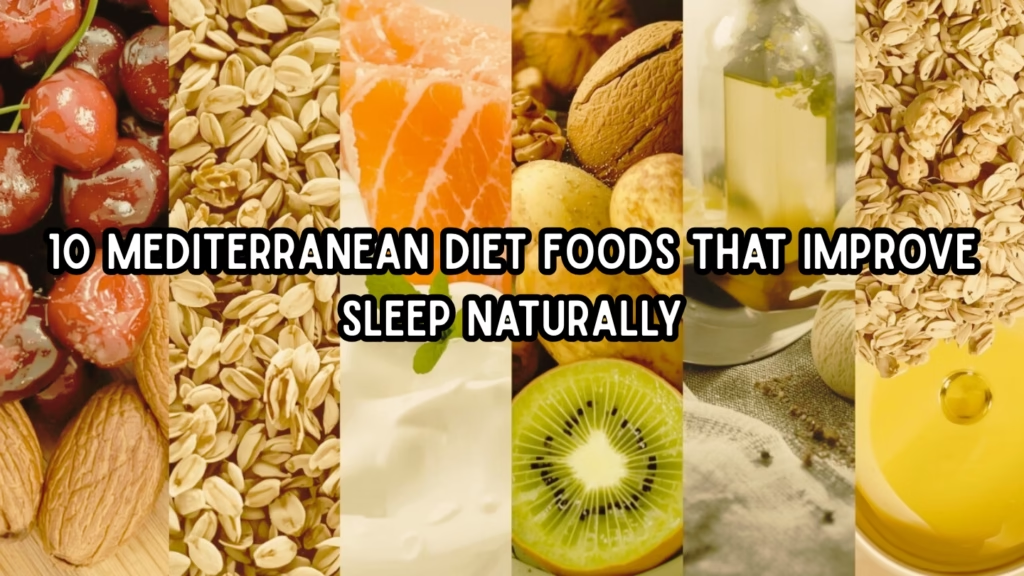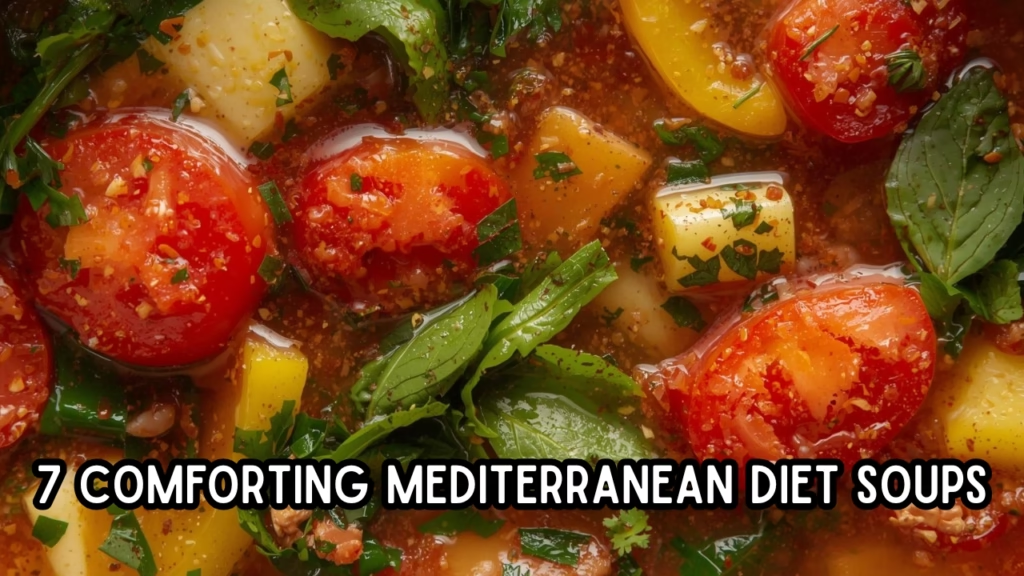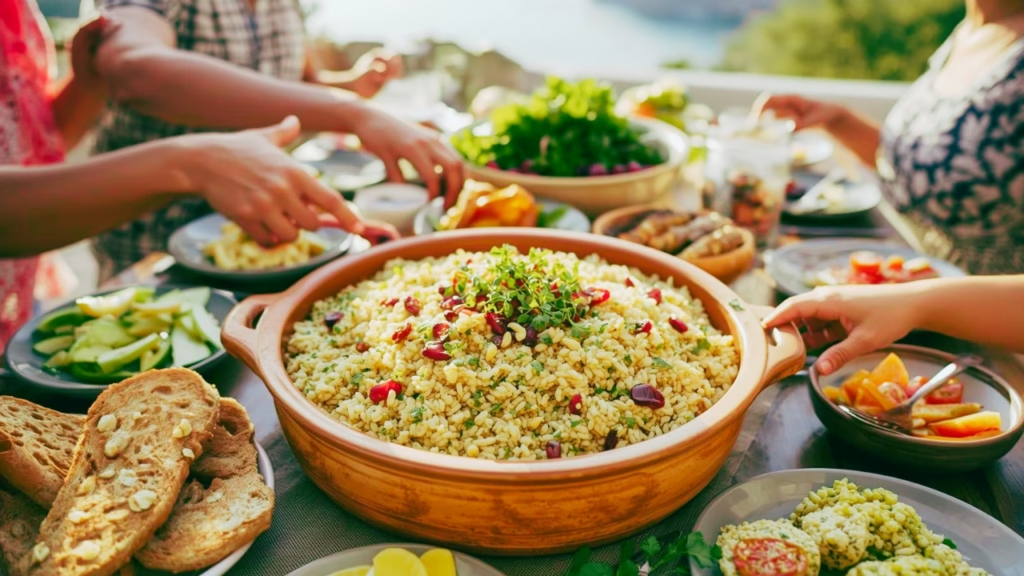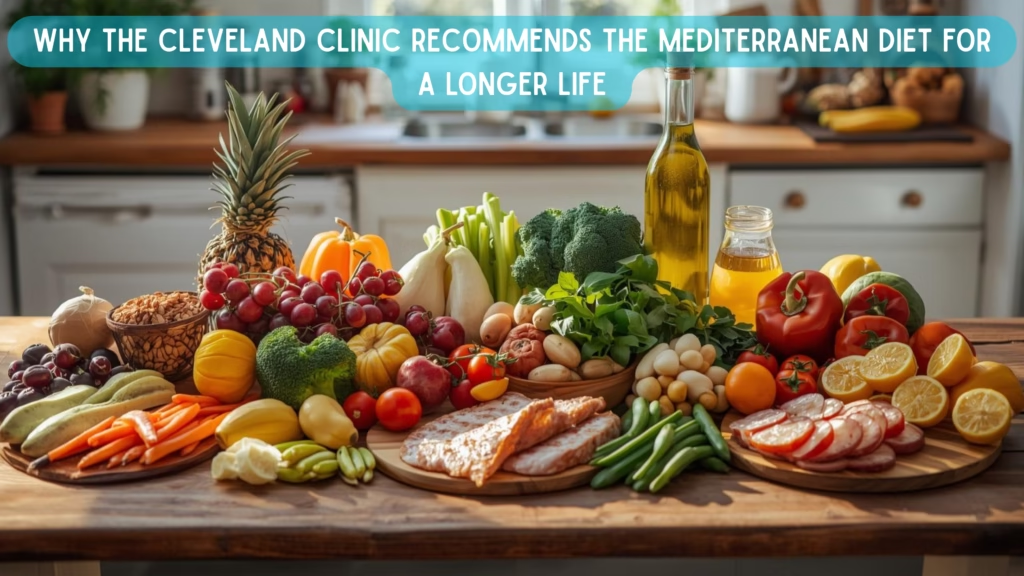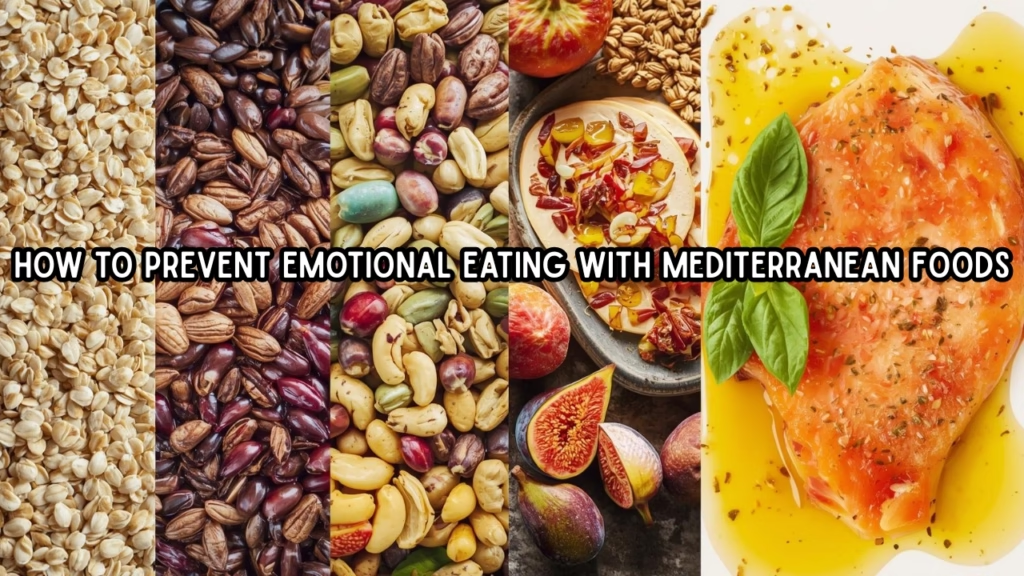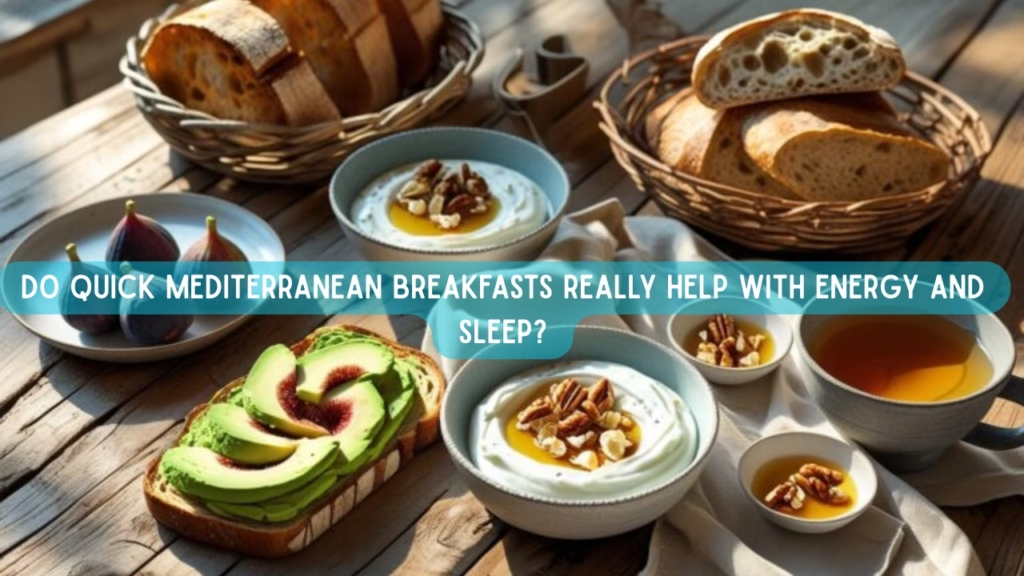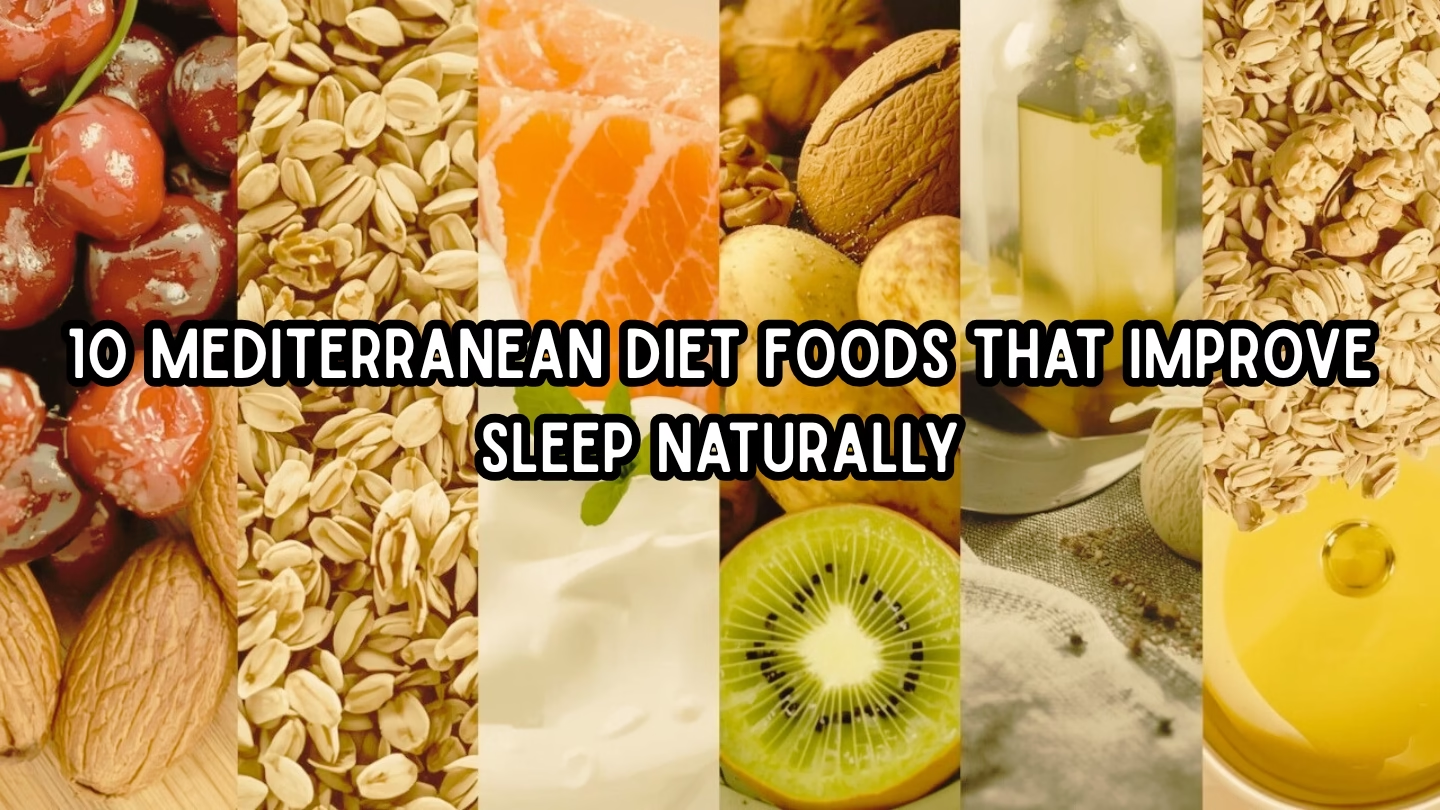
10 Mediterranean Diet Foods That Help You Sleep Better Naturally
You’ve tried counting sheep. You’ve downloaded meditation apps. You’ve even invested in blackout curtains and white noise machines. But what if the secret to better sleep has been hiding in your kitchen all along?
The truth is, what you eat has a profound impact on how well you sleep—and the Mediterranean diet offers some of the most powerful, natural sleep-promoting foods on the planet. If you’re struggling with restless nights, middle-of-the-night wake-ups, or that frustrating feeling of waking up exhausted despite spending eight hours in bed, Mediterranean Diet Foods That Improve Sleep Naturally might be exactly what you need.
Why Food Matters for Sleep
Before we dive into specific Mediterranean Diet Foods That Improve Sleep Naturally, let’s understand why certain foods help you sleep better while others keep you tossing and turning.
Your body produces several key hormones that regulate sleep. Melatonin is your natural sleep hormone that signals it’s time to rest. Serotonin promotes calm and converts into melatonin when needed. Tryptophan is the amino acid your body uses to make both serotonin and melatonin.
Additionally, magnesium relaxes muscles and calms the nervous system, while omega-3 fatty acids help regulate serotonin production. The beauty of Mediterranean Diet Foods That Improve Sleep Naturally is that they’re packed with these exact nutrients in their natural, food-based forms.
According to the Centers for Disease Control and Prevention, more than one-third of American adults don’t get enough sleep regularly. The Mediterranean diet offers a delicious, sustainable solution to this widespread problem.
1. Almonds: Magnesium-Rich Sleep Support
When it comes to Mediterranean Diet Foods That Improve Sleep Naturally, almonds deserve a top spot. These nutrient-dense nuts are packed with magnesium—a mineral that activates your parasympathetic nervous system, helping you feel calm and relaxed.
Magnesium also regulates melatonin production and maintains healthy GABA levels, a neurotransmitter that promotes sleep. Research in the Journal of Orthomolecular Medicine shows that even mild magnesium deficiency can lead to difficulty falling and staying asleep.
Almonds also contain quality protein and healthy fats that stabilize blood sugar throughout the night, preventing those frustrating 3 AM wake-ups. A small handful (about 23 almonds) makes an ideal evening snack, eaten raw, roasted, or sprinkled over Greek yogurt with honey.
2. Tart Cherries: Nature’s Melatonin Source
Tart cherries are one of the few natural food sources containing meaningful amounts of melatonin. Research published in the Journal of Medicinal Food found that adults who drank tart cherry juice twice daily for two weeks experienced significant improvements in sleep duration and quality.
Another study in the European Journal of Nutrition showed that tart cherry juice increased sleep time by an average of 84 minutes per night. The sleep benefits come not only from melatonin but also from powerful antioxidants called anthocyanins that reduce inflammation and extend tryptophan availability in your system.
Drink a small glass of tart cherry juice about an hour before bed, or enjoy a handful of fresh or frozen tart cherries as an after-dinner treat.
3. Salmon: Omega-3 Powerhouse
Fatty fish like salmon represent some of the most impressive Mediterranean Diet Foods That Improve Sleep Naturally. Salmon is loaded with omega-3 fatty acids and vitamin D—two nutrients that work together to regulate serotonin production and support healthy sleep patterns.
A study in the Journal of Clinical Sleep Medicine found that increasing omega-3 intake led to better sleep quality and fewer nighttime awakenings. Research from Johns Hopkins Medicine shows that vitamin D deficiency is strongly associated with poor sleep quality and daytime sleepiness.
Include salmon in your dinner 2-3 times per week, grilled with lemon and herbs, baked with olive oil and garlic, or in a light Mediterranean salad. For more protein-rich options, our guide to high-protein Mediterranean foods offers plenty of satisfying choices.
4. Kiwi: The Surprising Sleep Superfruit
A study at Taipei Medical University found that eating two kiwis one hour before bedtime led to significant improvements in sleep quality and duration. Participants fell asleep 35% faster and slept 13% longer after adding kiwi to their nightly routine.
Kiwis are rich in serotonin, which helps regulate sleep cycles. They also contain high levels of antioxidants and vitamin C that reduce oxidative stress interfering with sleep. The folate content supports neurotransmitter function, including production of sleep hormones.
Simply cut a kiwi in half and scoop out the flesh about an hour before bed, or add sliced kiwi to Greek yogurt for a sleep-promoting evening snack.
5. Walnuts: Melatonin-Rich Brain Food
Walnuts contain their own supply of melatonin, along with omega-3 fatty acids and magnesium—creating a perfect combination of sleep-supporting nutrients. Research in Nutrition journal found that walnuts contain enough melatonin to raise blood melatonin levels, potentially helping regulate your sleep-wake cycle.
What sets walnuts apart is their particularly high omega-3 content, specifically alpha-linolenic acid (ALA), which supports brain health and reduces inflammation that could interfere with quality sleep.
A small handful (about 7 whole walnuts) makes an ideal evening snack, eaten plain, lightly toasted, or chopped over Greek yogurt.
6. Greek Yogurt and Warm Milk: Tryptophan-Rich Comfort
Greek yogurt and warm milk are excellent Mediterranean Diet Foods That Improve Sleep Naturally. Both contain tryptophan—the amino acid precursor to serotonin and melatonin. Research in the American Journal of Clinical Nutrition suggests that consuming dairy products increases tryptophan availability, supporting natural sleep hormone production.
Greek yogurt offers additional benefits thanks to its probiotic content. Emerging research shows a fascinating connection between gut health and sleep quality—your gut microbiome influences serotonin production and may impact sleep patterns.
A small bowl of Greek yogurt topped with honey, almonds, and cinnamon makes an excellent evening snack. For more ideas, check out our guide to quick Mediterranean breakfasts for energy and better sleep.
7. Oats: The Evening Grain
Oats contain melatonin naturally, and their complex carbohydrates help increase tryptophan availability in the brain. Complex carbohydrates trigger insulin release, which helps remove other amino acids from the bloodstream, making it easier for tryptophan to cross the blood-brain barrier and convert to serotonin, then melatonin.
Oats are also rich in beta-glucan fiber, which stabilizes blood sugar levels overnight, preventing middle-of-the-night wake-ups. Prepare a small bowl of warm oatmeal with milk, topped with sliced banana, walnuts, and honey for a surprisingly effective evening snack.
8. Bananas: The Perfect Bedtime Fruit
Bananas are rich in both magnesium and potassium—two minerals that work together to relax tense muscles and calm the nervous system. They contain tryptophan and provide natural sugars paired with fiber, which stabilizes blood sugar throughout the night.
Research in Sleep Medicine Reviews confirms that magnesium plays a vital role in sleep regulation, helping maintain healthy GABA levels that promote relaxation. Simply eat a banana about an hour before bed, or slice it over Greek yogurt with cinnamon.
9. Herbal Teas: The Mediterranean Evening Ritual
Chamomile, lavender, and lemon balm teas are among the most soothing Mediterranean Diet Foods That Improve Sleep Naturally. Chamomile contains apigenin, an antioxidant that binds to brain receptors promoting sleepiness. Research in BMC Complementary Medicine and Therapies found that chamomile extract significantly improved sleep quality in elderly people.
Brew a cup of herbal tea 30-60 minutes before bedtime. The warmth is soothing, and the ritual signals your body it’s time to transition toward sleep.
10. Olive Oil: The Unsung Sleep Hero
Extra-virgin olive oil is rich in monounsaturated fats and polyphenols that reduce inflammation throughout the body, including neuroinflammation that can interfere with sleep. Research in the American Journal of Clinical Nutrition shows that diets high in monounsaturated fats are associated with better sleep quality compared to diets high in saturated fats.
Drizzle olive oil generously over salads, toss roasted vegetables in it, or use it as a base for light Mediterranean sauces as part of your evening meal.
Putting It All Together
Adding Mediterranean Diet Foods That Improve Sleep Naturally doesn’t mean overhauling your entire diet. Start small: snack on almonds or walnuts in the evening, enjoy a kiwi or banana as dessert, replace heavy dinners with salmon or a light yogurt bowl, and swap late-night coffee with chamomile tea.
The Mediterranean diet naturally avoids sleep-disrupting foods like caffeine after early afternoon, heavy cream-based meals, high-sugar desserts, and excessive alcohol—all of which interfere with quality rest.
The Science Behind Mediterranean Sleep Benefits
The connection between Mediterranean eating and sleep quality is backed by substantial research. A study in Nutrients journal found that higher adherence to the Mediterranean diet was associated with better sleep quality, particularly in older adults. Another study in the European Journal of Nutrition examined over 1,600 adults and found that those following Mediterranean eating patterns had significantly better sleep quality compared to those eating Western-style diets.
The Mediterranean diet’s anti-inflammatory properties may be particularly important for sleep, as chronic inflammation has been linked to insomnia and poor sleep quality.
Your Path to Better Sleep
Good sleep isn’t just about closing your eyes and hoping for the best. It’s about nourishing your body with the right nutrients at the right times. Mediterranean Diet Foods That Improve Sleep Naturally—from almonds and cherries to salmon and herbal teas—provide exactly what your body needs to fall asleep faster, stay asleep longer, and wake up genuinely refreshed.
These aren’t bland, boring health foods you have to choke down. They’re delicious, satisfying options that fit seamlessly into enjoyable meals and snacks. Start tonight with a small bowl of Greek yogurt topped with walnuts and honey, brew a cup of chamomile tea, and give your body the Mediterranean foods it needs for natural sleep support.
Your journey to better sleep starts with a single meal, a single snack, a single choice. Sweet dreams, the Mediterranean way.
SOURCES
We carefully draw from trusted, evidence-backed sources to ensure our content’s accuracy and reliability. These references provide both practical guidance and scientific support for the Mediterranean Diet Foods That Improve Sleep Naturally shared here:
“Nutrition’s Link to Sleep Quality” — Today’s Dietitian (magnesium, vitamin D, fiber tied to better sleep) Today’s Dietitian Magazine
“Influence of Dietary Sources of Melatonin on Sleep Quality: A Review” — PubMed (tart cherries as natural melatonin sources) PubMed
“Effects of Diet on Sleep Quality” — Advances in Nutrition (kiwi, dairy, cherries impact sleep) PMC
“Eat Right to Sleep Right | ColumbiaDoctors” — (links Mediterranean-style diet & nutrients to better sleep) ColumbiaDoctors
“Science Has Linked These 7 Foods and Beverages to Quality Sleep” — Verywell Health (tart cherry juice, etc.)
You May Also Like:
How to Make Homemade Pita Bread. A Simple Step-by-Step Guide
Pita Bread Making Pita bread represents one of the oldest forms of bread still commonly…
7 Comforting Mediterranean Diet Soups Made with Simple, Healthy Ingredients
Mediterranean diet soups represent a cornerstone of one of the world’s healthiest eating patterns, combining…
I’m from Bhutan. Here’s How I Combined Local Foods with the Mediterranean Diet for Better Energy
Growing up in Phuntsholing, I never imagined that the traditional Bhutanese foods my grandmother cooked…
Mediterranean Diet Whole Grains: The Complete Guide to Heart Health and Longevity
Mediterranean Diet Whole Grains: The Complete Guide to Heart Health and Longevity Mediterranean diet whole…
How to Combine Asian Spices with the Mediterranean Diet for Maximum Flavor and Health Benefits
Asian spices with the Mediterranean diet create an extraordinary culinary fusion that doesn’t just taste…
Cleveland Clinic Mediterranean Diet: Why It’s Best for a Longer Life
Why the Cleveland Clinic Recommends the Mediterranean Diet for a Longer Life Cleveland Clinic Mediterranean…
How to Prevent Emotional Eating with Mediterranean Foods
How to Prevent Emotional Eating with Mediterranean Foods How to prevent emotional eating with Mediterranean…
10 Mediterranean Diet Foods That Improve Sleep Naturally
10 Mediterranean Diet Foods That Help You Sleep Better Naturally You’ve tried counting sheep. You’ve…

Hello! I’m Sangay Choda, the creator of Mediterranean Diet Choice.
I’m not a doctor or licensed dietitian — I’m a health enthusiast who has spent years exploring the Mediterranean lifestyle and its proven benefits for long-term wellness, balance, and longevity.
My interest in this way of living began with a simple goal: to understand how everyday food choices can protect our hearts, improve energy, and support a happier life. Over time, I have researched and curated information from trusted medical and nutritional authorities, such as:
Harvard T.H. Chan School of Public Health
Mayo Clinic
World Health Organization (WHO)
National Institutes of Health (NIH) and more
I take complex, research-backed insights from these sources and transform them into easy-to-read, practical guides that anyone can apply — especially those looking to live healthier without restrictive diets or complicated plans.
While I do not offer medical advice, every article on this website is created with care, transparency, and a commitment to evidence-based information. My mission is to help readers make informed choices for a balanced, Mediterranean-inspired lifestyle.
Disclaimer: The content on this site is for informational and educational purposes only and should not be used as a substitute for professional medical advice. Always consult a qualified healthcare provider before making significant health or dietary changes. For more details, please visit our Disclaimer page.
For additional information about this website and its purpose, visit our About page. You can also review our Terms & Conditions to understand your rights and responsibilities when using this site.
Thank you for visiting Mediterranean Diet Choice.If you have questions, suggestions, or wish to collaborate, feel free to reach out at contact@mdietchoice.com or contact us.

